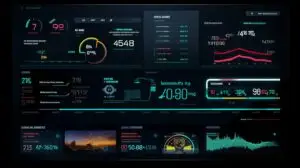In the fast-paced auto sales world, keeping a close eye on your Business Development Center’s (BDC) performance is key. You have to track many different numbers, like how fast you respond to calls and how many leads turn into sales. These numbers are super important because they help guide your sales team to do better. A great way to watch these numbers is by using BDC performance boards.
These boards make it easy to see the important stats and can really change the game for your team. Not every number is as important as the next, and picking the right ones to focus on can make a huge difference. Let’s talk about how to track the right metrics in your automotive BDC and why it matters. This way, you can make your team more productive and keep your customers happier.
Why Tracking the Right Metrics Matters
Tracking the right BDC metrics helps you understand how your team is doing and where you can improve. For example, if you notice that it takes too long to answer customer calls, you can take steps to fix that. This might mean training your team better or hiring more people. By keeping an eye on these numbers, you can make sure your customers have a great experience and are more likely to buy from you.
Making Metrics Work for You
Using performance boards is a smart way to keep track of these important numbers. These boards give everyone a clear view of how the team is doing and what needs work. It’s like having a scoreboard that everyone can see, which can motivate your team to improve.
Remember, the goal is to use these metrics to make better decisions and help your team succeed. By picking the right metrics to focus on and using performance boards effectively, you can boost your sales and make your customers happier. It’s all about finding what works best for your team and constantly looking for ways to do better.
Table of Contents
ToggleKey Takeaways
“Empower Your Team with Effective BDC Performance Boards”
Embracing BDC (Business Development Center) performance boards can significantly lift your team’s spirit and success. These boards do more than display figures; they drive action, dedication, and top-notch performance. By zeroing in on crucial metrics, you’re not merely tracking progress but motivating your team, celebrating wins, and refining your business approach. It’s vital to consistently review and tweak your strategies with reliable data to keep advancing. In doing so, data tracking becomes a powerful tool in boosting your team’s output.
“Turning Metrics into Success Drivers”
Grasping the importance of the right metrics is a game-changer. It’s beyond mere numbers; it’s about the stories those numbers tell. They highlight your strengths and pinpoint areas for improvement. This continuous feedback is key for setting and hitting targets.
Simple actions such as defining clear objectives, selecting pertinent metrics, and frequent performance reviews can greatly influence your team’s achievements. It’s all about making smart decisions that propel your business ahead.
The aim is to leverage these insights to inspire your team and constantly refine your business tactics. By doing so, you’re not just managing your business; you’re expanding it. So, harness the potential of BDC performance boards and steer your team towards greater heights.
Understanding BDC Performance Metrics

Unlocking the Power of BDC Metrics for Business Success
Tracking the right metrics is key to making your Business Development Center (BDC) successful. It’s like having a map that shows you where you’re doing great and where you need to improve. By keeping an eye on these numbers, you can make sure your team is always moving forward, giving customers a better experience and turning more leads into sales.
Why Metrics Matter
Metrics, like how many people your BDC talks to (contact rate) and how many sales you close (conversion rate), are super important. They tell you how well your team is doing. Think of it as a report card that shows what’s working and what’s not. This kind of information is gold because it helps everyone understand what they need to do better. And it’s not just about pointing out mistakes. It’s about celebrating wins and figuring out how to get more of them.
For example, when you know which part of your process is making customers happy, you can do more of that. And when you see a step that’s not working, you can fix it. This helps your team feel good about their work and keeps them aiming higher.
Making Metrics Work for You
To really get the most out of your metrics, you need a system that gives you live updates and can be tailored to what you’re interested in. This way, you can quickly see how things are going and make smart decisions.
Sales reports are a big piece of the puzzle, too. They show how well your team is doing with both new and returning customers. This helps managers shine a light on the most important numbers, like sales and customer happiness. It’s all about motivating your team and making sure everyone’s working towards the same goals.
In short, understanding and using your BDC metrics is a big deal. It helps you turn data into actions that grow your business. When you know exactly where you stand, you can make smart moves that lead to more sales and happier customers.
Implementing Performance Boards

Title: Boost Your Sales Team Performance with Digital Boards
Using digital performance boards changes the game for tracking your Sales BDC Performance KPIs. Now, you can see how your team is doing in real time. By linking these boards with your Customer Relationship Management (CRM) system, it’s not just about watching numbers go up and down. You get a full picture of how well your BDC agents are doing, covering everything from calls made and received to setting up meetings and closing deals. This kind of setup, where your CRM feeds directly into your performance boards, is key for a smart, data-driven way to oversee your BDC.
Deep Dive into Performance
Both team members and managers get a lot out of detailed BDC Performance Reports. These reports break down all the key numbers and outcomes, helping everyone understand what’s working well and what needs a tweak or two. This kind of detailed look is great for making smart changes that can help your dealership grow, become more profitable, and make customers happier.
Upgrade with Digital Dealership System
The Digital Dealership System steps things up by offering the latest tech for these performance boards. This includes keeping your content fresh and pricing that makes sense for your budget. This system ensures your BDC tools are more than just gadgets; they’re valuable resources that grow with your dealership. In the tough world of car sales, using digital performance boards helps you stay ahead by always keeping an eye on how well your BDC is doing.
Using digital boards to track Sales BDC Performance KPIs is a smart move. Not only does it give you real-time insights, but by connecting with your CRM, it offers a complete view of your team’s efforts and achievements. This approach is crucial for managing your BDC effectively and making informed decisions that drive success.
Tracking Agent Productivity

Boost Your Sales Team’s Performance with Agent Productivity Tracking
Using digital boards to see your sales team’s work is a smart move, but to really amp up your car dealership’s sales strategy, focusing on each salesperson’s performance with the right software is key. The best software for tracking Business Development Center (BDC) metrics can make a huge difference. It helps keep an eye on how salespeople are doing with phone calls, emails, and online chats. This way, you won’t miss any opportunities to connect with potential customers.
Here’s why keeping track of how your agents are doing can totally change the game:
- Find Strengths and Weaknesses: Understanding what each team member is good at can help you train them better.
- Drive Up Sales: When your team works more efficiently, you’re likely to see more sales and happier customers.
- Keep Everyone on Their Toes: Salespeople tend to do better when they know their work is being noticed and rewarded.
It’s important for BDCs to look at the right numbers to see how well each salesperson is doing. Remember, every salesperson plays a role in your dealership’s success. Keeping track of how your team is doing isn’t just about the numbers—it’s about pushing everyone to be their best.
Why Tracking Sales Agent Productivity Matters
Keeping an eye on agent productivity is a big deal for several reasons:
- Pinpointing Skills and Areas for Growth: When you know what each salesperson excels at and where they might need some help, you can tailor training and support to fit their needs. This personalized approach can lead to better performance across the board.
- Increasing Sales and Customer Happiness: More efficient work means more chances to make sales and keep customers coming back. Happy customers are the key to a thriving dealership.
- Promoting Responsibility: Sales agents are likely to put in more effort when they see that their hard work doesn’t go unnoticed. Recognizing and measuring performance can boost motivation and drive.
Focusing on the performance of each sales agent with the help of the right tools and metrics is essential for any dealership aiming for success. While 34 might be just a number, it signifies that every individual on the team is vital for achieving collective goals. Tracking productivity is about more than just keeping score—it’s about striving for excellence and getting the best out of your team.
Analyzing BDC Data

Boost Your Dealership’s Sales and Customer Service with BDC Data Analysis
Exploring BDC data analysis is a powerful way for car dealerships to identify trends in performance and make smart decisions that enhance sales effectiveness and customer interaction. By using tools like BDC Performance Tracking Reports and CRM-connected Sales BDC Performance Reporting, dealerships can dive into the essential data. But it’s not just about looking at numbers. It’s about understanding the story each number tells, from how often contact with customers is made to how well appointments are scheduled.
When it comes to Automotive BDC, using data to guide both sales and customer service is key. A deep dive into the data can reveal where your Sales BDC is doing great or needs improvement. This knowledge lets you focus on specific training, increase accountability, and set clear, realistic goals.
Focus on What Matters: KPIs
Paying attention to key performance indicators (KPIs) means your analysis matches up with what your dealership wants to achieve. Whether the aim is to make the sales process smoother or to better customer interactions, the point is to use data for making useful decisions. By keeping an eye on BDC data regularly, you’re not just watching how things are going; you’re actively making your sales environment more focused on customers and more efficient.
Tips for Success
To truly benefit from BDC data analysis, here are some suggestions:
- Keep It Simple: Use clear, simple language that anyone can understand.
- Avoid Jargon: Stay away from overused terms and phrases that don’t add value.
- Explain the ‘Why’: Always provide context. Explain why something matters instead of just stating it.
- Mix It Up: Use a variety of sentence lengths to keep your writing engaging and easy to read.
Enhancing Team Motivation

Boosting Team Motivation for Better Sales and Customer Service
Understanding BDC data analysis is crucial for improving sales and how we connect with customers. But, it’s also key to focus on motivating our team to get the best results. Creating a work environment where everyone feels appreciated and eager to do their best isn’t just about reaching goals; it’s about building a positive space for everyone. Here are tips on making that happen:
- Feedback and Quality Checks: It’s important not just to watch the numbers but also to give helpful feedback. This shows team members where they need to improve and how to get better.
- Boost Agent Performance: Making sure everyone manages their time well helps the team do their best work. Quickly fixing any problems with how work gets done keeps our customer service top-notch.
- Training and Rewards: Keeping the team motivated means offering training regularly and connecting rewards to how well they do their jobs. This keeps everyone focused on getting better and working hard each week.
Why These Steps Matter
Giving feedback and checking on quality helps everyone know how they’re doing and where they can improve. This makes it easier for them to do better work.
- Managing time well means we can serve our customers better and make sure every team member is doing their part.
- Offering training and rewards keeps the team interested and focused on their goals, which means better results for everyone.
- These tips are all about making sure our team feels supported and motivated to reach our shared goals. This not only leads to better sales and customer service but also creates a happier and more productive work environment.
Conclusion
Boost Your Team’s Success with BDC Performance Boards
Using BDC (Business Development Center) performance boards is a powerful way to lead your team to victory. These boards don’t just show numbers; they inspire action, commitment, and excellence. By focusing on the right metrics, you’re not just keeping track of progress; you’re encouraging your team, celebrating achievements, and mastering your business strategy. It’s important to regularly check and adjust your strategies based on solid data to keep improving. This way, you turn data tracking into a tool that transforms your team’s performance.
Make Metrics Work for You
Understanding why tracking the right metrics matters can make a big difference. It’s not just about numbers on a board; it’s about what those numbers represent. They tell you where you’re doing well and where you can improve. This feedback loop is crucial for setting goals and achieving them.
Simple steps like setting clear goals, picking the right metrics to track, and regularly reviewing performance can significantly impact your team’s success. It’s about making informed decisions that drive your business forward.
Remember, the goal is to use these insights to motivate your team and refine your approach continually. This way, you’re not just running your business; you’re growing it. So, embrace the power of BDC performance boards and let them guide your team to new heights.
Frequently Asked Questions
What Is BDC in Automotive?
Understanding the Role of a BDC in Car Dealerships
In the world of car sales, a Business Development Center (BDC) plays a key role. It’s the team in a car dealership that handles calls and messages from customers, sets up meetings, and makes sure to sync up afterward. This work is super important for keeping customers happy and making sales. By using special software that connects to their customer relationship management (CRM) system, BDCs can keep an eye on how well their team is doing, manage both incoming and outgoing communication, and keep track of important numbers related to meetings and sales.
Why BDCs Matter in Automotive Sales
A BDC is like the heartbeat of a car dealership’s sales effort. It’s all about talking to customers, figuring out what they need, and making sure they feel taken care of. This isn’t just about making a sale; it’s about creating a relationship. Happy customers come back, and they tell their friends and family about their great experience. This is why the work of a BDC is central to a dealership’s success.
The tools that BDCs use are pretty high-tech. They can see how many calls are coming in, how many appointments are being set, and how the team is doing overall. This info helps them do their job better and sell more cars.

Zach White is a leading writer in digital signage, known for making complex technology both clear and compelling. With a background in Communication Technology and a passion for visual communication, he specializes in breaking down the latest trends in digital sign systems for industry professionals and enthusiasts alike. As a writer for a top digital signage company, Zach blends technical insight with creative vision to highlight how these systems transform public spaces and communication.
A regular speaker at industry events, he stays at the cutting edge of innovation—keeping his readers informed and inspired.





